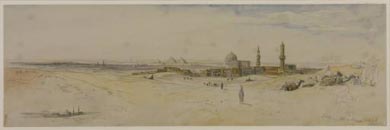Friday, 19 March 1858
No sleep, ― the people & carriages moving all through the night ― & dogs barking. Rose at 6, last packing ― breakfast. ― Carriage with G. to Railroad. Price ― 4/ ― 2nd Class places ― very airy & comfortable. Eunuchs & women ― costumes ― Levantines. Civil English Conductor. ― Off at 9. ― At 10 ― or thereabouts ― a standstill ― owing to special train of Indian passengers being telegraphed. We waited about 2 hours before they passed ― lots of children. ― The waiting world ate sugarcane intanto.1 Thence to Damanhour, & to Kasr es Zayat,2 by crossing the river in a steam boat. ― On quicker ― Tanta ― very picturesque. Noisy lot of Levantines ― 2 women &c. in next compartment. Renewal of Egyptian impressions, the immense green plains! The birds ― Zikzacs,3 & white egrets, hawks, herded crows, gulls, plovers, ducks! ― Camels, in those long streams ― asses, sheep in black masses, ― spotted goats ― horses, oxen ― buffali ―: those endlessly varied costumes & figures! ― The mud villages ― pigeon houses, palm trees, Sonts & Sycamores, & canals ― dogs ― &c. &c. ―― the great moving panorama, delighted me. I am thankful today, just as in 1848. By 7 we reached Cairo ― & in a carriage came to Williams’s Hotel. W. ― & Mrs. Manson ― & the rooms, just as in 1853-4 ― when Daddy was here, & poor Seddon! He & Swinburne gone since then. Dined well ― one English & one Frenchman here.
[Transcribed by Marco Graziosi from Houghton Library, Harvard University, MS Eng. 797.3.]

